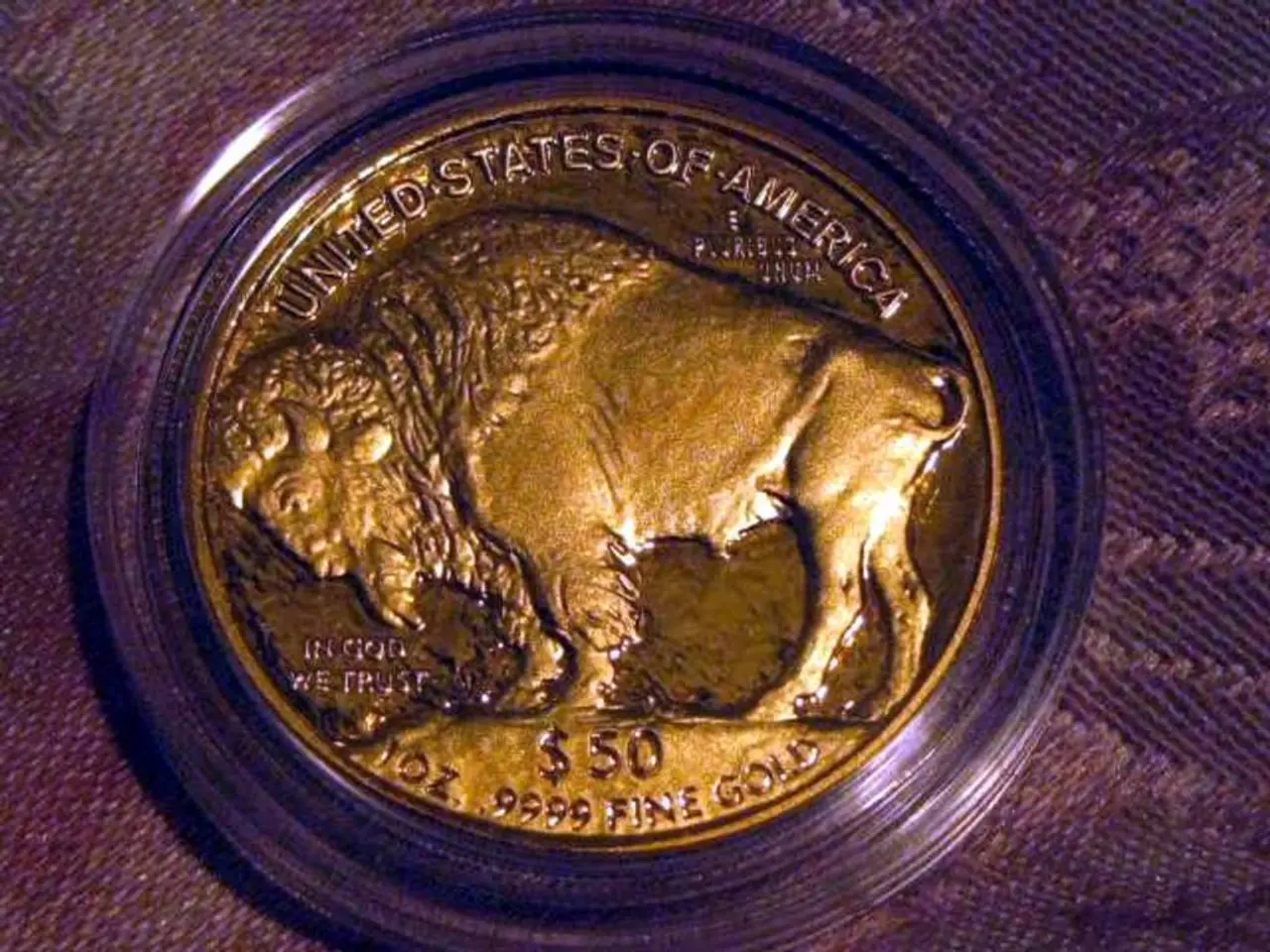Thai currency, the baht, exhibits resilience amid a weak domestic economy, triggering worries among exporters about increased pressure.
==========================================================
The Thai Baht has experienced a significant appreciation against the US dollar, a trend primarily driven by external factors. According to Wachirawat Banchuen, Senior Financial Market Strategist at Siam Commercial Bank, this appreciation is largely influenced by weakening US economic data, easing US-Thai trade tensions, increased foreign investment inflows into Thai equities, rising gold prices, and global financial market volatility [1][3][5].
The key reasons behind the baht's appreciation include US economic data, notably weak employment figures, fueling bets on multiple Fed rate cuts this year, weakening the greenback [3][5]. Easing trade tensions, notably tariff relief with the US, have improved the export outlook and foreign investor sentiment towards Thailand [1]. Foreign funds have bought significant Thai equities, totalling approximately $640 million net inflows since July, pushing local stocks up and supporting the currency [1].
The Bank of Thailand's dovish stance with recent rate cuts contrasts with the Fed's cuts, but market forces favour baht strength due to the broad dollar weakness [2][5]. However, this appreciation presents a major policy challenge amid heightened economic fragility.
Potential negative impacts on Thailand’s economy from sharp baht appreciation include export competitiveness erosion, risk to the manufacturing and industrial sectors, pressure on tourism, and undermining monetary policy effectiveness [2][3]. In response, the Bank of Thailand has intervened by purchasing dollars to moderate the baht's rise, leading to record-high international reserves [3].
Foreign investors have continued to pour funds into Thai bonds since the start of the year, totaling approximately 59 billion baht. The baht's volatility has reached 8.7% since the beginning of 2025, up from 8% in 2024. Thailand's foreign exchange reserves are nearing their previous all-time high of USD 259 billion, currently at USD 257 billion [6].
Kriengkrai Thiennukul, Chairman of the Federation of Thai Industries (FTI), stated that the baht's rapid fluctuations are having a tangible impact on exporters. Sanguan Jungsakul, Senior Director of Investment Market Research at Krungthai Bank, believes the reserves may reach a new record soon and that the current appreciation of the Thai baht is unusually rapid and primarily driven by short-term speculative flows into gold and a weaker US dollar [4].
Sanguan expects the baht to trade within a range of 32.50-33.00 baht per US dollar, provided there are no further surges in gold prices or no continued weakening of the US dollar. However, the appreciating Thai baht may further pressure the economy, particularly the export sector.
In summary, the baht’s recent sharp appreciation is driven largely by external macroeconomic developments impacting the US dollar and positive foreign investor sentiment in Thailand, but it raises concerns about hurting the country’s export-driven economy and complicating monetary policy management [1][2][3][5].
References:
[1] Reuters. (2025, March 1). Thai baht surges on trade tensions easing, foreign inflows. Retrieved from https://www.reuters.com/article/us-thailand-economy-forex/thai-baht-surges-on-trade-tensions-easing-foreign-inflows-idUSKBN2BK03K
[2] Bangkok Post. (2025, February 20). Baht's strength poses challenges for Bank of Thailand. Retrieved from https://www.bangkokpost.com/business/1973593/bahts-strength-poses-challenges-for-bank-of-thailand
[3] The Nation. (2025, March 5). Baht's appreciation raises concerns for Thai economy. Retrieved from https://www.nationthailand.com/business/30413719
[4] Bloomberg. (2025, March 2). Thailand's Baht Strengthens Amid Global Gold Rally, U.S. Dollar Weakness. Retrieved from https://www.bloomberg.com/news/articles/2025-03-02/thailand-s-baht-strengthens-amid-global-gold-rally-u-s-dollar-weakness
[5] CNBC. (2025, February 15). Thailand's baht surges to 3-year high on U.S.-Thai trade tensions easing, Fed rate cut expectations. Retrieved from https://www.cnbc.com/2025/02/15/thailands-baht-surges-to-3-year-high-on-us-thai-trade-tensions-easing-fed-rate-cut-expectations.html
[6] Investor.gov. (2025). Thailand Foreign Exchange Reserves. Retrieved from https://www.investor.gov/intl-companies/foreign-investors/reports-and-data/economic-reports/thailand-foreign-exchange-reserves
- The strengthening Thai economy, as indicated by the appreciation of the Thai Baht, has attracted significant foreign investment in Thai equities, thereby impacting the local stock market and business sector.
- Despite the Bank of Thailand's efforts to intervene by purchasing dollars to moderate the baht's rise, the strength of the Thai currency remains a concern for the tourism industry due to its potential effects on export competitiveness and the manufacturing sector.
- The rapid appreciation of the Thai Baht, driven by external macroeconomic factors and positive foreign investor sentiment, has raised questions about its impact on the country's finance and business sectors, particularly in the context of the Fed's monetary policy and global financial market volatility.




